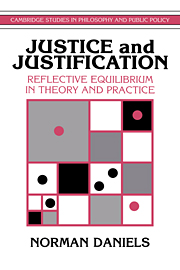Book contents
- Frontmatter
- Contents
- Preface
- 1 Introduction: Reflective equlibrium in theory and practice
- PART I
- 2 Wide reflective equilibrium and theory acceptance in ethics
- 3 Reflective equilibrium and Archimedean points
- 4 On some methods of ethics and linguistics
- 5 Two approaches to theory acceptance in ethics
- 6 An argument about the relativity of justice
- 7 Moral theory and the plasticity of persons
- 8 Reflective equilibrium and justice as political
- PART II
- Index
4 - On some methods of ethics and linguistics
Published online by Cambridge University Press: 01 February 2010
- Frontmatter
- Contents
- Preface
- 1 Introduction: Reflective equlibrium in theory and practice
- PART I
- 2 Wide reflective equilibrium and theory acceptance in ethics
- 3 Reflective equilibrium and Archimedean points
- 4 On some methods of ethics and linguistics
- 5 Two approaches to theory acceptance in ethics
- 6 An argument about the relativity of justice
- 7 Moral theory and the plasticity of persons
- 8 Reflective equilibrium and justice as political
- PART II
- Index
Summary
Characterizing a person's syntactic competency by formulating a grammar that accounts for it may be the main task of descriptive syntactic theory, but determining that a person's moral competency is characterized by a particular set of principles is not the main task of moral philosophy. To be sure, moral philosophy must formulate precise statements of different moral conceptions. But it also must face the task of choosing between competing moral conceptions, of solving the problems of justification and theory acceptance in the moral domain. Because I believe the method of wide reflective equilibrium reveals a complexity in the structure of ethical theories that makes the problem of theory acceptance more tractable than it is on other approaches, I would like to free wide equilibrium from an unnecessary or, at least, overstated analogy to linguistic method. That analogy, first proposed in Rawls' A Theory of Justice only reinforces the erroneous view that the moral philosopher interested in reflective equilibrium has confused moral anthropology with moral philosophy.
I shall first distinguish narrow and wide reflective equilibria, showing in the process that narrow equilibrium has a strong similarity to methods in syntactic theory. It is wide equilibrium, however, not narrow, that is of interest to the moral philosopher - and for just the features which distinguish it from certain features of syntactics. As we shall see, because of these features choosing between competing moral conceptions in wide equilibrium has a close analogy to the problem of choosing between alternative deductive logics.
Information
- Type
- Chapter
- Information
- Justice and JustificationReflective Equilibrium in Theory and Practice, pp. 66 - 80Publisher: Cambridge University PressPrint publication year: 1996
